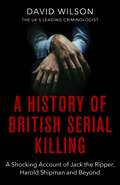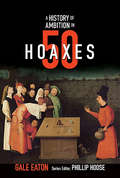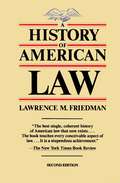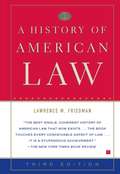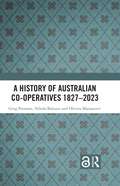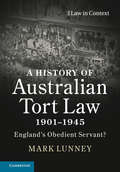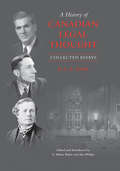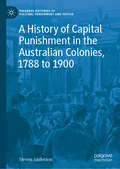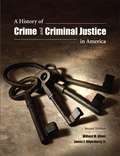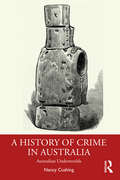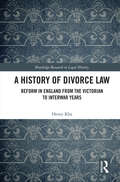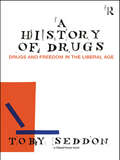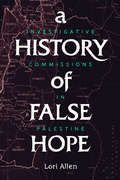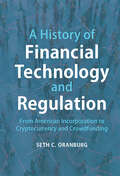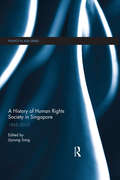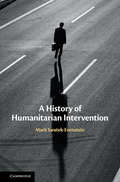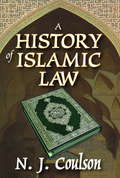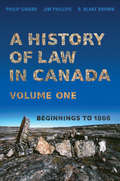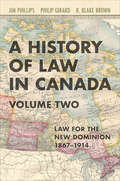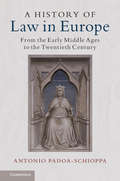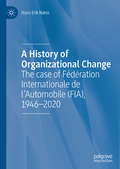- Table View
- List View
A History Of British Serial Killing: The Shocking Account of Jack the Ripper, Harold Shipman and Beyond
by David WilsonBE THE FIRST TO READ DAVID WILSON'S NEW TRUE CRIME BOOK "A PLOT TO KILL" BY PRE-ORDERING NOW Expanded and updated, this is the definitive history of British serial killing 1888-2020 - by the UK's leading criminologist, David WilsonIn this fascinating and informative book, Professor David Wilson tells the stories of Britain's serial killers from Jack the Ripper to the extraordinary Suffolk Murders case. David Wilson has worked as a Prison Governor and as a profiler, and has been described as the UK's leading expert on serial killers. His work has led him to meet several of the UK's deadliest killers, and build up fascinating insights into what makes a serial killer - and who they are most likely to target. A vivid narrative history and a call for prison and social reform, Professor Wilson's new book is a powerful and gripping investigation of Britain's serial murderers.
A History Of British Serial Killing: The Shocking Account of Jack the Ripper, Harold Shipman and Beyond (The Books of Babel)
by David WilsonBE THE FIRST TO READ DAVID WILSON'S NEW TRUE CRIME BOOK "A PLOT TO KILL" BY PRE-ORDERING NOW Expanded and updated, this is the definitive history of British serial killing 1888-2020 - by the UK's leading criminologist, David WilsonIn this fascinating and informative book, Professor David Wilson tells the stories of Britain's serial killers from Jack the Ripper to the extraordinary Suffolk Murders case. David Wilson has worked as a Prison Governor and as a profiler, and has been described as the UK's leading expert on serial killers. His work has led him to meet several of the UK's deadliest killers, and build up fascinating insights into what makes a serial killer - and who they are most likely to target. A vivid narrative history and a call for prison and social reform, Professor Wilson's new book is a powerful and gripping investigation of Britain's serial murderers.
A History of Ambition in 50 Hoaxes (History in #50)
by Phillip Hoose Gale EatonWhat do the Trojan Horse, Piltdown Man, Keely Motor Company, and Ponzi Scheme have in common? They were all famous hoaxes, carefully designed and bolstered with false evidence. The con artists in this book pursued a variety of ambitions--making money, winning wars, mocking authority, finding fame, trading an ordinary life for a glamorous one--but they all chose the lowest, fastest road to get there. Every hoax is a curtain, and behind it is a deceiver operating levers and smoke machines to make us see what is not there and miss what is. As P.T. Barnum knew, you can short-circuit critical thinking in any century by telling people what they want to hear. Most scams operate on a personal scale, but some have shaped the balance of world power, inspired explorers to sail uncharted seas, derailed scientific progress, or caused terrible massacres. A HISTORY OF AMBITION IN 50 HOAXES guides us through a rogue's gallery of hustlers, liars, swindlers, imposters, scammers, pretenders, and cheats. In Gale Eaton's wide-ranging synthesis, the history of deception is a colorful tour, with surprising insights behind every curtain.
A History of American Law
by Lawrence M. FriedmanIn this update of the 1985 edition cited in Books for College Libraries, 3rd ed. , Friedman (law, Stanford U. ) presents a social history tracing law in America from the Colonial and frontier eras to the present. The accessible reader's main emphasis remains on the 19th century but treatment of such contemporary legal issues as environmental law, the death penalty, and family law has been expanded and in some cases, reflects the author's evolving views. He concludes that the US legal system is unlikely...
A History of American Law: Third Edition
by Lawrence M. FriedmanIn this brilliant and immensely readable book, Lawrence M. Friedman tells the whole fascinating story of American law from its beginnings in the colonies to the present day. By showing how close the life of the law is to the economic and political life of the country, he makes a complex subject understandable and engrossing. A History of American Law presents the achievements and failures of the American legal system in the context of America's commercial and working world, family practices, and attitudes toward property, government, crime, and justice. Now completely revised and updated, this groundbreaking work incorporates new material regarding slavery, criminal justice, and twentieth-century law. For laymen and students alike, this remains the only comprehensive authoritative history of American law.
A History of Australian Co-operatives 1827-2023
by Greg Patmore Nikola Balnave Olivera MarjanovicCo-operatives provide a different approach to organising business through their ideals of member ownership and democratic practice. Every co-operative member has an equal vote regardless of his or her own personal capital investment. They take a variety of different forms, including consumer co-operatives, agricultural co-operatives, worker co-operatives and financial co-operatives. Patmore, Balnave and Marjanovic provide a perspective on Australian co-operative development within a conceptual framework and international context since the 1820s by exploring the economic, political and social factors that explain their varying fortunes. Drawing upon the Visual Historical Atlas of Australian Co-operatives, a significant database of Australian co-operatives and a variety of historical sources, this book provides a detailed historical analysis of their development, from their inception in Australia to today. Australian co-operatives were heavily dependent on state sympathy for their growth and vulnerable to ideas that challenged collective organisation such as Neo-liberalism. Despite these challenges, the co-operative business model has persisted and since 2009, there has been resurgence of interest and organisation that may provide a platform for future growth. A useful resource for practitioners, students, educators, policy makers and researchers that highlights a significant alternative business model to the Investor-Owned Business and state enterprise.
A History of Australian Co-operatives 1827–2023
by Greg Patmore Nikola Balnave Olivera MarjanovicCo-operatives provide a different approach to organising business through their ideals of member ownership and democratic practice. Every co-operative member has an equal vote regardless of his or her own personal capital investment. They take a variety of different forms, including consumer co-operatives, agricultural co-operatives, worker co-operatives and financial co-operatives.Patmore, Balnave and Marjanovic provide a perspective on Australian co-operative development within a conceptual framework and international context since the 1820s by exploring the economic, political and social factors that explain their varying fortunes. Drawing upon the Visual Historical Atlas of Australian Co-operatives, a significant database of Australian co-operatives and a variety of historical sources, this book provides a detailed historical analysis of their development, from their inception in Australia to today. Australian co-operatives were heavily dependent on state sympathy for their growth and vulnerable to ideas that challenged collective organisation such as Neo-liberalism. Despite these challenges, the co-operative business model has persisted and since 2009, there has been resurgence of interest and organisation that may provide a platform for future growth.A useful resource for practitioners, students, educators, policy makers and researchers that highlights a significant alternative business model to the Investor-Owned Business and state enterprise.The Open Access version of this book, available at http://www.taylorfrancis.com, has been made available under a Creative Commons [Attribution-Non Commercial-No Derivatives (CC-BY-NC-ND)] 4.0 license.
A History of Australian Tort Law 1901–1945: England's Obedient Servant? (Law in Context)
by Mark LunneyLittle attention has been paid to the development of Australian private law throughout the first half of the twentieth century. Using the law of tort as an example, Mark Lunney argues that Australian contributions to common law development need to be viewed in the context of the British race patriotism that characterised the intellectual and cultural milieu of Australian legal practitioners. Using not only primary legal materials but also newspapers and other secondary sources, he traces Australian developments to what Australian lawyers viewed as British common law. The interaction between formal legal doctrine and the wider Australian contexts in which that doctrine applied provided considerable opportunities for nuanced innovation in both the legal rules themselves and in their application. This book will be of interest to both lawyers and historians keen to see how notions of Australian identity have contributed to the development of an Australian law. Places twentieth-century Australian tort law development in the context of British race patriotism. Recognises the cultural and intellectual environment in which Australian lawyers operated and how this environment influenced their perceptions of their contribution. Provides a new account of the relationship between general conceptions of national identity and the development of an Australian law; in particular, how far Australian law differed from the English common law it was assumed to follow.
A History of Canadian Legal Thought
by J. Phillips George Blain Baker R.C.B. RiskThis volume in the Osgoode Society's distinguished series on the history of Canadian law is a collection of the principal essays of Professor Emeritus R.C.B. Risk, one of the pioneers of Canadian legal history and for many years regarded as its foremost authority on the history of Canadian legal thought.Frank Scott, Bora Laskin, W.P.M. Kennedy, John Willis and Edward Blake are among the better known figures whose thinking and writing about law are featured in this collection. But this compilation of the most important essays by a pioneer in Canadian legal history brings to light many other lesser known figures as well, whose writings covered a wide range of topics, from estoppel to the British North America Act to the purpose of legal education. Written over more than two decades, and covering the immediate post-Confederation period to the 1960s, these essays reveal a distinctive Canadian tradition of thinking about the nature and functions of law, one which Risk clearly takes pride in and urges us to celebrate.
A History of Capital Punishment in the Australian Colonies, 1788 to 1900 (Palgrave Histories of Policing, Punishment and Justice)
by Steven AndersonThis book provides a comprehensive overview of capital punishment in the Australian colonies for the very first time. The author illuminates all aspects of the penalty, from shortcomings in execution technique, to the behaviour of the dying criminal, and the antics of the scaffold crowd. Mercy rates, execution numbers, and capital crimes are explored alongside the transition from public to private executions and the push to abolish the death penalty completely. Notions of culture and communication freely pollinate within a conceptual framework of penal change that explains the many transformations the death penalty underwent. A vast array of sources are assembled into one compelling argument that shows how the ‘lesson’ of the gallows was to be safeguarded, refined, and improved at all costs. This concise and engaging work will be a lasting resource for students, scholars, and general readers who want an in-depth understanding of a long feared punishment.Dr. Steven Anderson is a Visiting Research Fellow in the History Department at The University of Adelaide, Australia. His academic research explores the role of capital punishment in the Australian colonies by situating developments in these jurisdictions within global contexts and conceptual debates.
A History of Crime and Criminal Justice in America
by Willard Oliver James HilgenbergThis updated second edition provides an overview of the origin and development of the American criminal justice system, from the founding of Jamestown, the first English settlement, and tracing history to the events of September 11, 2001. Each chapter begins with an overview of the social, political, and economic forces that shaped society during a given era in American history. What follows, then, is an overview of the ordinary and extraordinary crimes of each era, and how the criminal justice system (police, courts, corrections, and juvenile justice) responded to these crimes, thereby conveying how the system developed over time.
A History of Crime in Australia: Australian Underworlds
by Nancy CushingThis book provides a lively and accessible account of Australia’s most prominent crimes and criminals of the nineteenth and twentieth century and offers an informative background for those seeking to understand crimes committed today. A History of Crime in Australia examines the imposition of English law on this ancient continent, and how its operation affected both transported offenders from Great Britain and Ireland, and the Aboriginal and Torres Strait Islander peoples whose own systems of Law were overlaid. Drawing upon cutting-edge research in the field, original work by the author, and essays from leading crime history researchers, it addresses the question of whether there was an Australian underworld. In doing so, it provides background for well known offenders including bushranger Ned Kelly and the razor gangs of the 1920s and for sensational crimes like the Mount Rennie Outrage, the Pyjama Girl Mystery and the Shark Arm Murder and the miscarriage of justice following the disappearance of Azaria Chamberlain at Uluru in 1980. Through these case studies, the book draws out points of tension and cohesion within Australian society, exposing the enduring anxiety around those who were considered to be outsiders, and how the criminal justice system was used to manage these concerns. This book includes a guide to conducting research in the field of Australian crime history and sources for further study. Designed as an introductory text for students, this book will be of interest to those studying criminology and crime history, and anyone who would like to deepen their understanding of crime’s place in Australia’s social and cultural history.
A History of Cyber Security Attacks: 1980 to Present
by Bruce MiddletonStories of cyberattacks dominate the headlines. Whether it is theft of massive amounts of personally identifiable information or the latest intrusion of foreign governments in U.S. government and industrial sites, cyberattacks are now important. For professionals and the public, knowing how the attacks are launched and succeed is vital to ensuring cyber security. The book provides a concise summary in a historical context of the major global cyber security attacks since 1980. Each attack covered contains an overview of the incident in layman terms, followed by a technical details section, and culminating in a lessons learned and recommendations section.
A History of Divorce Law: Reform in England from the Victorian to Interwar Years (Routledge Research in Legal History)
by Henry KhaThe book explores the rise of civil divorce in Victorian England, the subsequent operation of a fault system of divorce based solely on the ground of adultery, and the eventual piecemeal repeal of the Victorian-era divorce law during the Interwar years. The legal history of the Matrimonial Causes Act 1857 is at the heart of the book. The Act had a transformative impact on English law and society by introducing a secular judicial system of civil divorce. This swept aside the old system of divorce that was only obtainable from the House of Lords and inadvertently led to the creation of the modern family justice system. The book argues that only through understanding the legal doctrine in its wider cultural, political, religious, and social context is it possible to fully analyse and assess the changes brought about by the Act. The major developments included the end of any pretence of the indissolubility of marriage, the statutory enshrinement of a double standard based on gender in the grounds for divorce, and the growth of divorce acrossall spectrums of English society. The Act was a product of political and legal compromise between conservative forces resisting the legal introduction of civil divorce and the reformers, who demanded married women receive equal access to the grounds of divorce. Changing attitudes towards divorce that began in the Edwardian period led to a gradual rejection of Victorian moral values and the repeal of the Act after 80 years of existence in the Interwar years. The book will be a valuable resource for academics and researchers with an interest in legal history, family law, and Victorian studies.
A History of Drugs: Drugs and Freedom in the Liberal Age
by Toby SeddonWhy are some psychoactive substances regarded as ‘dangerous drugs’, to be controlled by the criminal law within a global prohibition regime, whilst others – from alcohol and tobacco, through to those we call ‘medicines’ – are seen and regulated very differently? A History of Drugs traces a genealogy of the construction and governance of the ‘drug problem’ over the past 200 years, calling into question some of the most fundamental ideas in this field: from ‘addiction’ to the very concept of ‘drugs’. At the heart of the book is the claim that it was with the emergence in the late eighteenth century of modern liberal capitalism, with its distinctive emphasis on freedom, that our concerns about the consumption of some of these substances began to grow. And, indeed, notions of freedom, free will and responsibility remain central to the drug question today. Pursuing an innovative inter-disciplinary approach, A History of Drugs provides an informed and insightful account of the origins of contemporary drug policy. It will be essential reading for students and academics working in law, criminology, sociology, social policy, history and political science.
A History of False Hope: Investigative Commissions in Palestine
by Lori AllenThis book offers a provocative retelling of Palestinian political history through an examination of the international commissions that have investigated political violence and human rights violations. More than twenty commissions have been convened over the last century, yet no significant change has resulted from these inquiries. The findings of the very first, the 1919 King-Crane Commission, were suppressed. The Mitchell Committee, convened in the heat of the Second Intifada, urged Palestinians to listen more sympathetically to the feelings of their occupiers. And factfinders returning from a shell-shocked Gaza Strip in 2008 registered their horror at the scale of the destruction, but Gazans have continued to live under a crippling blockade. Drawing on debates in the press, previously unexamined UN reports, historical archives, and ethnographic research, Lori Allen explores six key investigative commissions over the last century. She highlights how Palestinians' persistent demands for independence have been routinely translated into the numb language of reports and resolutions. These commissions, Allen argues, operating as technologies of liberal global governance, yield no justice—only the oppressive status quo. A History of False Hope issues a biting critique of the captivating allure and cold impotence of international law.
A History of Financial Technology and Regulation: From American Incorporation to Cryptocurrency and Crowdfunding
by Seth C. OranburgUsing the lens of history, A History of Financial Technology and Regulation illuminates recent changes to the world of finance. With lucid prose and the help of concrete examples, Seth Oranburg helps readers understand the role of technology in finance today, including complex phenomena such as mutual funds, cryptocurrencies, and the stock market itself. Chapters begin with basic principles and historical analogy before describing complex digital-investment strategies and instruments. Readers will also gain an introduction to key concepts in financial regulation, learning how law and regulations prevented some financial crises while perpetuating others. Oranburg concludes with ideas about what's next for finance and how the law should respond. This book will appeal to specialists and nonspecialists alike who are interesting in learning more about business, economics, finance, law, and regulation.
A History of Human Rights Society in Singapore: 1965-2015 (Politics in Asia)
by Jiyoung SongTo celebrate Singapore’s fiftieth anniversary for its independence from Malaysia in 2015, 35 students, academics and activists came together to discuss and write about pioneering Singaporean human rights activists and their under-reported stories in Singapore. The city-state is known for its remarkable economic success while having strict laws on individual freedom in the name of national security, public order and racial harmony. Singapore’s tough stance on human rights, however, does not negate the long and persistent existence of a human rights society that is little known to the world until today. This volume, composed of nine distinctive chapters, records a history of human rights activists, their campaigns, main contentions with the government, survival strategies and other untold stories in Singapore’s first 50 years of state-building.
A History of Humanitarian Intervention
by Mark Swatek-EvensteinThe question of 'humanitarian intervention' has been a staple of international law for around 200 years, with a renewed interest in the history of the subject emerging in the last twenty years. This book provides a chronological account of the evolution of the discussion and uncovers the fictional narrative provided by international lawyers to support their conclusions on the subject, from justifications and arguments for 'humanitarian intervention', the misrepresentation of great power involvement in the Greek War of Independence in 1827, to the 'humanitarian intervention that never was', India's war with Pakistan in 1971. Relying on a variety of sources, some of them made available in English for the first time, the book provides an undogmatic, alternative history of the fight for the protection of human rights in international law.
A History of Islamic Law (Islamic Surveys Ser.)
by N. CoulsonLawyers, according to Edmund Burke, are bad historians. He was referring to an unwillingness, rather than an inaptitude, on the part of early nineteenth-century English lawyers to concern themselves with the past: for contemporary jurisprudence was a pure and isolated science wherein law appeared as a body of rules, based upon objective criteria, whose nature and very existence were independent of considerations of time and place. Despite the influence of the historical school of Western jurisprudence, Burke's observation is generally valid for Middle East studies. Muslim jurisprudence in its traditional form provides an extreme example of a legal science divorced from historical considerations. Law, in classical Islamic theory, is the revealed will of God, a divinely ordained system preceding, and not preceded by, the Muslim state controlling, but not controlled by, Muslim society. There can thus be no relativistic notion of the law itself evolving as an historical phenomenon closely tied with the progress of society. The increasing number of nations that are largely Muslim or have a Muslim head of state, emphasizes the growing political importance of the Islamic world, and, as a result, the desirability of extending and expanding the understanding and appreciation of their culture and belief systems. Since history counts for much among Muslims and what happened in 632 or 656 is still a live issue, a journalistic familiarity with present conditions is not enough; there must also be some awareness of how the past has molded the present. This book is designed to give the reader a clear picture. But where there are gaps, obscurities, and differences of opinion, these are also indicated.
A History of Law and Lawyers in the GATT/WTO
by Gabrielle MarceauHow did a treaty that emerged in the aftermath of World War II and barely survived its early years evolve into one of the most influential organizations in international law? This unique book brings together original contributions from an unprecedented number of eminent current and former GATT and WTO staff members--including many current and former Appellate Body members--to trace the history of law and lawyers in the GATT/WTO and explore how the nature of legal work has changed over the institution's sixty-year history. It paints a fascinating portrait of the development of the rule of law in the multilateral trading system and allows some of the most important names in GATT and WTO history to share their stories and reflect on the WTO's remarkable journey from a "provisionally applied treaty" to an international organization defined by its commitment to the rule of law. This volume provides a new perspective on the role of law and lawyers in the GATT/WTO Secretariats that highlights the multiple roles of lawyers and non-lawyers in enhancing the rule of law in the multilateral trading system.
A History of Law in Canada, Vol. 1: Beginnings to 1866 (Osgoode Society for Canadian Legal History #1)
by R. Blake Brown Philip Girard Jim PhillipsThis book is the first of two volumes devoted to the history of law in Canada. This volume begins at a time just prior to European contact and continues to the 1860s, while volume two will start with Confederation and end at approximately 2000. The history of law includes substantive law, legal institutions, legal actors and legal culture. The book assumes that since 1500 there have been three legal systems in Canada – the Indigenous, the French, and the English. At all times, these systems have co-existed and interacted, with the relative power and influence of each being more or less dominant in different periods. The history of law cannot be treated in isolation, and this book examines law as a dynamic process, shaped by and affecting other histories over the long term. The law guided and was guided by economic developments, was influenced and moulded by the nature and trajectory of political ideas and institutions, and variously exacerbated and mediated by inter-cultural exchange and conflict. These themes are apparent in this examination, and through most areas of law including family law, constitutional, commercial, land settlement and tenure, and criminal.
A History of Law in Canada, Volume Two: Law for a New Dominion, 1867–1914 (Osgoode Society for Canadian Legal History)
by R. Blake Brown Philip Girard Jim PhillipsThis is the second of three volumes in an important collection that recounts the sweeping history of law in Canada. The period covered in this volume witnessed both continuity and change in the relationships among law, society, Indigenous peoples, and white settlers. The authors explore how law was as important to the building of a new urban industrial nation as it had been to the establishment of colonies of agricultural settlement and resource exploitation. The book addresses the most important developments in the seventeenth, eighteenth, and nineteenth centuries, including legal pluralism and the co-existence of European and Indigenous law. It pays particular attention to the Métis and the Red River Resistance, the Indian Act, and the origins and expansion of residential schools in Canada. The book is divided into four parts: the law and legal institutions; Indigenous peoples and Dominion law; capital, labour, and criminal justice; and those less favoured by the law. A History of Law in Canada examines law as a dynamic process, shaped by and affecting other histories over the long term.
A History of Law in Europe: From the Early Middle Ages to the Twentieth Century
by Antonio Padoa-SchioppaWith its roots in ancient Greece, Roman law and Christianity, European legal history is the history of a common civilisation. The exchange of legislative models, doctrines and customs within Europe included English common law and has been extensive from the early middle ages to the present time. In this seminal work which spans from the fifth to the twentieth century, Antonio Padoa-Schioppa explores how law was brought to life in the six main phases of European legal history. By analysing a selection of the institutions of private and public law which are most representative of each phase and of each country, he also sheds light on the common features throughout the history of European legal culture. Translated in English for the first time, this new edition has been revised to include the recent developments of the European Union and the legal-historical works of the last decade.
A History of Organizational Change: The case of Fédération Internationale de l’Automobile (FIA), 1946–2020
by Hans Erik NæssThis book is the first independent exploration of the Fédération Internationale de l’Automobile’s (FIA) institutional history. Virtually unexamined compared with similar institutions like the FIFA and the IOC, the FIA has nevertheless changed from being a small association in 1904 to becoming one of the world’s most influential sport governing bodies. Through chronologically organised chapters, this book explains how the FIA manages to link together motorsport circuses like Formula 1 with the automotive industry and societal issues like road safety and environmental sustainability. In an exciting narrative spanning seven decades, it reviews the FIA’s organisational turning points, governing controversies, political dramas and sporting tragedies. Considering the FIA to be a unique type of hybrid organisation characterised by what the author calls ‘organisational emulsion’, this case study contains theoretical innovations relevant to other studies of sport governing bodies. It makes an empirically grounded contribution to the research fields of institutional logics, historical sociology and sport governance.
